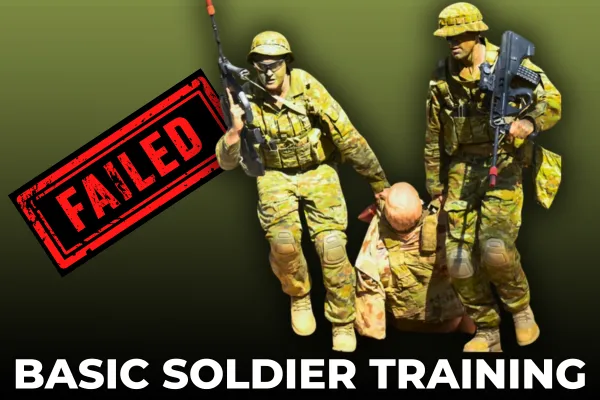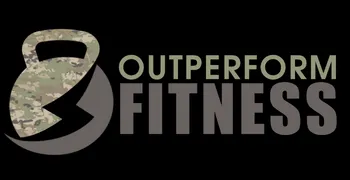Welcome to the Outperform blog page - your ultimate destination for discovering the secrets to unlocking your full potential in the realm of tactical professions. Whether you're striving to achieve your dream career or looking to elevate your fitness for better job performance, we've got you covered.
Article Topics:

From Setback to Success: How Kate Overcame Failure at Kapooka and Came Back Stronger
The Reality of Basic Training: Not Everyone Passes on the First Go
For many aspiring soldiers, basic training at Kapooka is one of the toughest challenges they will ever face. It’s designed to break you down, push you beyond your limits, and transform civilians into soldiers. But what happens when you give it everything... and still don’t make it through?
This is exactly what happened to Kate. She arrived at Kapooka full of confidence, physically strong, and mentally prepared. But after two weeks of relentless training, she found herself facing the harsh reality of failure. Instead of marching out with her platoon, she was sent home.
For most, this could be the end of the road. But for Kate, it was just the beginning of her comeback story.
Why Kate Joined the Army Reserves
Kate’s passion for service didn’t come out of nowhere. Growing up in a family that deeply valued Anzac Day and military service, she was always drawn to the idea of representing her country. A former elite-level athlete in Taekwondo, she had spent her twenties competing at an international level and narrowly missing out on the Olympics.
After retiring from competitive sport in 2020, Kate started looking for her next challenge. The Army Reserves became a natural fit, providing an opportunity to develop valuable skills while she also pursued a career as a firefighter. With her younger brother serving full-time in the Army, she felt a deep connection to military service.
“I’ve never missed a dawn service as long as I can remember,” Kate says. “Now, it’s pretty special to actually be part of that tradition as an active member.”
The Brutal Reality of Kapooka
Despite her athletic background, Kate quickly realised that military fitness was an entirely different ball game. But the physical challenges weren’t what set her back—it was the weapons training.
Kapooka’s weapons module is one of the key gateways recruits must pass to successfully complete training. With limited time to learn, high-pressure assessments, and strict standards, even small mistakes can mean the difference between success and failure.
“I just wasn’t picking it up fast enough,” she admits. “And unfortunately, because I had been performing well in all other areas, I slipped through the cracks. By the time staff realised I needed extra help, it was too late.”
Despite multiple retests and retraining attempts, Kate didn’t meet the standard in time. She was told she would be going home.
“It absolutely shattered me. I never thought I’d be the one going home unless I was seriously injured.”
The Comeback Mindset: Choosing Resilience Over Defeat
After returning home, Kate had two choices: let the failure define her or use it as fuel for her comeback. She chose the latter.
Instead of dwelling on disappointment, she immediately reached out to her unit for extra support. Within 24 hours, her sergeant had her on the next available Kapooka course. She threw herself into weapons training, studying her notes relentlessly and attending additional practice sessions at her unit.
“I wasn’t going to leave anything to chance. I knew exactly what I needed to fix, so I made sure I fixed it.”
Facing Kapooka Again: A Different Experience the Second Time Around
Walking through the gates of Kapooka a second time brought a whole new set of nerves. This time, she knew exactly what to expect, but that also made the anticipation worse.
“There’s something about knowing what’s coming that makes it even harder. The first time, it’s the fear of the unknown. The second time, you know what’s coming, and you’re just waiting for it.”
This experience was completely different. Kate was more prepared, more confident, and had a fresh determination to succeed. She had a new group of staff and platoon mates, and though the social dynamic was different, she knew this was her chance to prove herself.
When the weapons module rolled around, Kate nailed it. And this time, her previous instructors were there to witness her success.
“My old platoon sergeant was standing right there when I passed. He shook my hand and said, ‘McAdam, you did it.’ That was one of the best moments of my life.”
Later, her previous section commander even sought her out to personally congratulate her.
“That meant everything to me. It just showed that they really do want you to succeed. They’re not there to break you down just for the sake of it. They push you because they want to see you make it.”
Lessons from Kate’s Journey
Kate’s story is one of resilience, adaptability, and the power of a comeback mindset. Here are some key takeaways for anyone preparing for Kapooka—or any tough challenge in life:
✅ Control the Controllables – You can’t control every challenge, but you can control your preparation. Train hard, study hard, and go in with the right mindset.
✅ Seek Out Help Early – If you’re struggling with something, don’t wait until it’s too late. Speak up, ask for guidance, and use all the resources available to you.
✅ Failure Isn’t the End – Setbacks happen. What matters is how you respond. If you’re serious about achieving your goal, treat failure as feedback, fix what needs fixing, and come back stronger.
✅ Build Your Tactical Fitness – Physical preparation is one thing you CAN control. Being fit doesn’t just make Kapooka easier—it helps you handle stress, fatigue, and the mental load of training.
Watch the full interview here:
Ready to Get Battle Ready?
If you’re preparing for basic training or a tactical career, fitness is non-negotiable. My Fit For Service training plan is designed to get you combat-ready, focusing on strength, endurance, and the specific demands of military fitness.
🔗 Learn more here: info.outperformfitness.com.au/getbattleready
Kate’s story proves that resilience wins in the end. If you’re willing to put in the work, you CAN succeed.
What’s your next step?
WANT TO GET
BATTLE READY?
Specialised online fit-prep program for ADF & First Responder applicants
Copyright Outperform Fitness © 2023.





